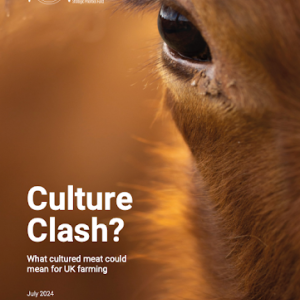
Can farmers and the cultured meat industry find common cause? This report explores what UK farmers think about cultured meat and how the technology could affect them. Although cultured meat and animal agriculture industries are cast as opponents, interviews with farmers found potential synergies that could underpin a new and more productive debate.
Publisher’s summary
This report explores what UK farmers think about cultured meat and how the technology could affect them in practice. It summarises a two-year interdisciplinary study, analysing social media, discussing the technology with groups of farmers, working with diverse farm businesses across the UK, and modelling novel approaches to cultured meat production based on agricultural by-products . Our team and partners included natural and social scientists, farming representatives, cultured meat businesses, NGOs and policy makers.
We found mixed feelings among farmers, from angry reactions on social media and concerns over the technology’s wider impacts, to pragmatic engagement with the specific risks and opportunities it could present. While the discussions focused predominantly on risks, the technology was not seen as an immediate threat to livestock farming. Indeed, its impacts seem slow burn, compared to the volatility and uncertainty farmers face daily from input costs and supply contracts, geopolitical uncertainty, trade deals and exchange rates, policy changes, business succession and weather.
Cultured meat, along with other meat and dairy alternatives, may drive substantial restructuring in farming, but on a timeframe that businesses can potentially plan for, and adjust to. The technology may even hold opportunities for some farmers, creating new markets for raw materials, adding value to current waste streams or even producing cultured meat on farm.
Crucially, the ways farmers can prepare for these possibilities – the keystones of resilience and agility – are nothing new. For the growing cultured meat industry, by contrast, the stakes in its relationship with farming may be higher. Until recently, with exceptions, the technology’s implications for farming have been taken for granted and the views of farmers largely overlooked.8 Yet understanding agricultural supply chains, and how cultured meat would compete with or complement meat from animals, is critical to providing insights into the economic viability, and environmental and social impact of culture meat.
Farmers’ views may also prove pivotal to this technology’s viability. Bans in Italy and parts of the US show how concerns over the effects on farming communities, existing industries and food culture can shape policy, regulation and investment. The recent politicisation of farmer protests in Wales and England, and their seismic impact in the Netherlands, suggest the UK is not immune to such effects. Can farmers and the cultured meat industry find common cause? We end this report by setting out three ways this might be possible.
Reference
MacMillan, T.C., Lewis, K., Dooley, J.J., Morgans, L.C., Sexton, A.E., Ali, M., Allan, S., Argyle, I., Dunsford, I., Goodman, M.K., Lynch, J., Manning, L., Ranawana, V., Rose, D.C., Rothman, R., Sibly, W., Vasilopoulos, A., Wylie, A. (2024). Culture Clash? What cultured meat could mean for UK farming. Transforming UK Food Production. July 2024.
Read more here. See also the TABLE explainer, Meat, metrics and mindsets: Exploring debates on the role of livestock and alternatives in diets and farming.












Post a new comment »